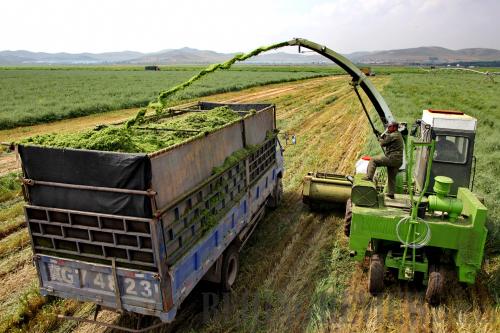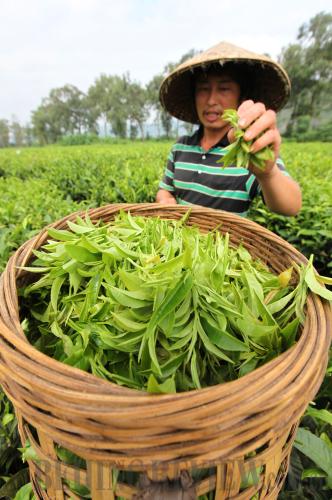|
 |
|
THE GRASS IS ALWAYS GREENER: Workers at the Saibei Farm in the northern part of north China's Hebei Province harvest oat grass on September 7 (YANG SHIYAO) |
Moderate Inflation
China's consumer price index (CPI), a main gauge of inflation, eased to 2 percent year on year in August, marking the lowest level in four months, according to data released by the National Bureau of Statistics (NBS) on September 11.
For the first eight months, CPI rose 2.2 percent from a year ago, which was far lower than the government full-year inflation control target of 3.5 percent.
The producer price index (PPI), which measures inflation at the wholesale level, dropped 1.2 percent year on year in August, according to the NBS.
The PPI declined for the 30th month in a row and at a faster pace than the previous month, confirming pressure from slowing economic growth.
The PPI dropped 0.9 percent in July, 1.1 percent in June and 1.4 percent in May.
Yu Qiumei, a senior statistician of the NBS, attributed the decline to prices falling for a series of industrial products and material. Prices of crude oil and oil products ended their rising streak and started falling in August, while prices of coal, steel, concrete and cement continued to decline.
Delegating Powers
The State Council said on September 10 that it will further cut administrative approvals and delegate power to lower-level governments this year in order to promote efficiency and clear obstacles standing in the way of economic growth.
The move is aimed at eliminating up to 200 administrative approval items by the end of 2014. Over the past year, the State Council has cut or adjusted 632 administrative approval items, according to a news conference held by the State Council in Beijing on September 10.
These efforts are being made to spur market dynamics and to ensure that the market is allowed to play a decisive role in resource allocation, said Li Zhangze, spokesman for the Leading Group Office on Reform of the Administrative Approval System of the State Council.
Up for adjustment are approval of investment plans by businesses, daily operation of enterprises and scrutiny of the qualifications of enterprises, organizations or individuals.
"The next step is to speed up the process to transfer government functions and relax restrictions on approvals and confirmations of some professional qualifications," Li said.
He said the abolished items cover a wide range of industries, from telecommunications businesses to aviation and coal mining. Other items, such as freight shipped by water and rail, which previously required Central Government approval, now will only need approval at the provincial level.
Global Financial Reform
China on September 9 called for emerging markets and developing countries to have a greater say in the global financial system, claiming that the system should be further reformed in this direction.
Wang Min, China's Deputy Permanent Representative to the United Nations, made the remarks when speaking at the UN General Assembly after it approved a resolution to negotiate and adopt a multilateral legal framework for sovereign debt restructuring processes to improve the global financial system.
China and 123 other UN member states voted in favor of the resolution, drafted by Bolivia on behalf of the Group of 77, composed of developing nations, and China. Eleven countries, including the United States, voted against it and 41 abstained.
"China maintains that the international financial system needs to be further reformed, and efforts should be made to further improve the international norms governing sovereign debt restructuring in order to enhance the voice of emerging markets and developing countries," Wang said.
Meanwhile, Wang voiced his hope that the international community will soon join hands for the prudent establishment of an efficient, effective and development-oriented mechanism of sovereign debt restructuring and settlement.
 |
|
SOLAR BREW: A farmer in Liucheng County of Liuzhou, Guangxi Zhuang Autonomous Region, picks White Dew Tea on September 9. White Dew, the 15th of the 24 Chinese solar terms, begins this year on September 8 and ends on September 23 (DENG KEYI) |
Pollution Charges Up
China's top economic planner announced on September 5 that it will double charges for pollutant disposal in the latest move against pollution.
Charges on pollutants in sewage and exhaust gas disposal will be respectively set at no less than 1.4 yuan ($0.23) and 1.2 yuan ($0.19) per pollution equivalent, according to a notice jointly released by the National Development and Reform Commission, Ministry of Finance and Ministry of Environmental Protection.
Currently, the rates are 0.7 yuan ($0.11) and 0.6 yuan ($0.09). The notice requires local authorities to properly adopt the change before the end of June 2015.
Thermal power, steel, cement and papermaking industries will be the most affected by the policy, analysts said.
In the meantime, the government will encourage regions that are both highly polluted and developed to formulate higher standards for such charges.
"Regions should set up differentiated charging mechanisms to impose higher standards on enterprises that have surpassed the emission limits, while adopting lower standards on businesses that have made greater efforts to treat pollution," read the notice.
Wang Jinnan, an official with the Ministry of Environmental Protection, said the new standard will bring the charges closer to the actual cost of pollution treatment.
China started charging for pollutant disposal in 2003, but the low fees have thus far created little incentive for companies to cut emissions.
Cross-Straits Investment
Investment between the Chinese mainland and Taiwan has surged this year, an official said on September 10.
In the first seven months, mainland authorities approved 1,284 projects featuring investment by Taiwanese businesses, a 10.2-percent increase from the same period last year, while $1.47-billion Taiwanese investment has been put into use, said Ma Xiaoguang, spokesman of the State Council Taiwan Affairs Office.
The authorities have also approved 34 investment projects or mainland enterprises to operate in Taiwan, totalling $195 million, which exceeds the annual total of $177 million last year.
The mainland has long encouraged Taiwanese enterprises to develop on the mainland, issuing a number of favorable policies. Measures have also been taken to make it more convenient for the Taiwanese to travel across the Straits and find jobs as well as to receive education and medical care.
Ma said that mainland authorities will continue their economic reform to provide better conditions and policies for Taiwanese business people to invest on the mainland.
Railway Construction
China has accelerated railway construction to fulfill its annual targets in this area, new data have indicated.
Fixed-asset investment in the sector in the first eight months amounted to 405 billion yuan ($66 billion), up 20 percent from a year ago, according to data released on September 9 by the China Railway Corp. (CRC).
The figure suggested China is more than halfway to hitting the expected 2014 railway investment, and marked the most rapid progress in the railway industry in recent years.
The CRC said it has prepared enough capital for the remaining investment and is confident of meeting the construction targets based on current progress.
At the start of 2014, China set targets of investing 800 billion yuan ($130.4 billion) in railway construction, putting 7,000 km of railway into operation and starting construction on 64 new rail projects this year.
As of August, 46 of the 64 new projects had been approved and 14 railways had started operation, with the rest of the work expected to be finished on schedule. | 